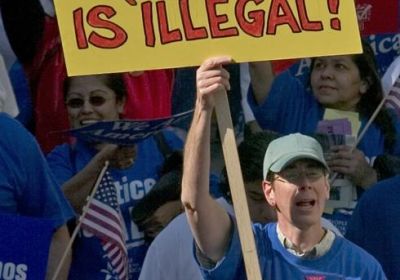
-
 The 2008 election of Barack Obama appeared to herald a new dawn for 12 million undocumented immigrants, many of them laboring in the US’s most exhausting and underpaid workplaces. The president’s own aunt, 58-year-old Zeituni Onyango, was forced to live “without papers” in Boston when a judge rejected her original petition for asylum in 2004. So it seemed Obama would be sympathetic to the plight of immigrants at least. However, mounting evidence indicates life is becoming increasingly miserable for the undocumented population in the US.
The 2008 election of Barack Obama appeared to herald a new dawn for 12 million undocumented immigrants, many of them laboring in the US’s most exhausting and underpaid workplaces. The president’s own aunt, 58-year-old Zeituni Onyango, was forced to live “without papers” in Boston when a judge rejected her original petition for asylum in 2004. So it seemed Obama would be sympathetic to the plight of immigrants at least. However, mounting evidence indicates life is becoming increasingly miserable for the undocumented population in the US. -
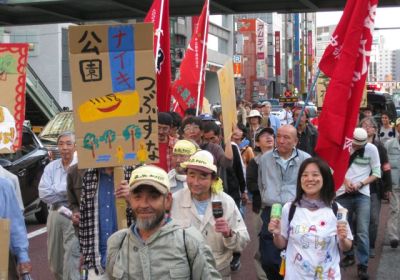 A long running struggle to save a public park in the central Tokyo ward of Shibuya from private development by sporting goods company Nike intensified on September 15. The Shibuya ward authorities sealed off the park and deployed police and private security guards to stop activists and homeless people who live in the park from re-entering. Activists had been occupying the park since March. Situated in the centre of downtown Tokyo, Miyashita Park has long been an oasis of trees amid the high-rise buildings and expensive retail outlets of Shibuya.
A long running struggle to save a public park in the central Tokyo ward of Shibuya from private development by sporting goods company Nike intensified on September 15. The Shibuya ward authorities sealed off the park and deployed police and private security guards to stop activists and homeless people who live in the park from re-entering. Activists had been occupying the park since March. Situated in the centre of downtown Tokyo, Miyashita Park has long been an oasis of trees amid the high-rise buildings and expensive retail outlets of Shibuya. -
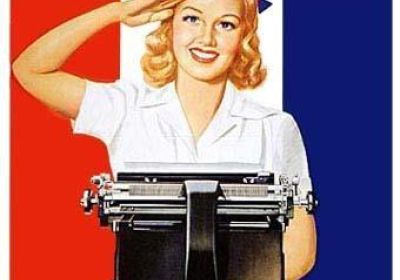
As if straight out of a Cold War era movie, US corporate media outlets such as the Miami Herald ran headlines on September 18 claiming scientists from Albuquerque “tried to sell classified nuclear data to Venezuela”. Readers were no doubt shocked to read in the Miami Herald that “an elderly maverick scientist who battled the scientific community for decades over laser fusion was indicted Friday in New Mexico, charged with trying to sell classified nuclear weapons data to Venezuela”.
-
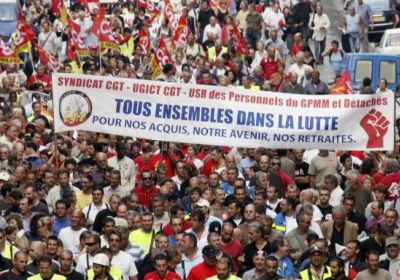
More than three million people took part in strikes and protests across France on September 23. They were demanding the withdrawal of laws that will dramatically reduce the right of workers to access pensions. The protests, which had been called by a coalition of seven of France’s union confederations, showed that the passage of the Pension Bill through France’s lower house of parliament had done nothing to weaken opposition to the attack on pensions.
-
 The announcement by the Cuban Trade Union Confederation (CTC) on September 13 about plans to reduce the state sector workforce by half a million was greeted by jeering headlines from journalists outside the island. Cuba is rarely of interest to the corporate press unless they believe there is some crisis to celebrate or that new measures can be interpreted as evidence of a shift from socialism to capitalism.
The announcement by the Cuban Trade Union Confederation (CTC) on September 13 about plans to reduce the state sector workforce by half a million was greeted by jeering headlines from journalists outside the island. Cuba is rarely of interest to the corporate press unless they believe there is some crisis to celebrate or that new measures can be interpreted as evidence of a shift from socialism to capitalism. -
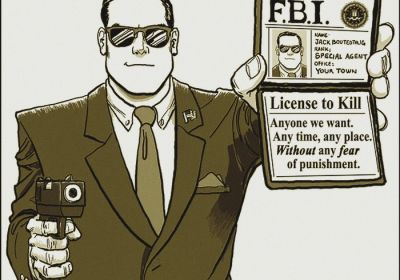 The statement below was released on September 24 by the International Action Centre, IACentre.org * * * We denounce the Federal Bureau of Investigation harassment of anti-war and solidarity activists in several states across the country. The FBI began turning over six houses in Chicago and Minneapolis this morning, September 24, 2010, at 8am. The FBI handed subpoenas to testify before a federal grand jury to about a dozen activists in Illinois, Minnesota, and Michigan.
The statement below was released on September 24 by the International Action Centre, IACentre.org * * * We denounce the Federal Bureau of Investigation harassment of anti-war and solidarity activists in several states across the country. The FBI began turning over six houses in Chicago and Minneapolis this morning, September 24, 2010, at 8am. The FBI handed subpoenas to testify before a federal grand jury to about a dozen activists in Illinois, Minnesota, and Michigan. -
 When I heard about the strike that was planned by Italian Football players in Serie A league on September 25 and 26 (but has been postponed), I wondered what familiar refrains would be used to attack it. The inevitable “millionaires complaining about their conditions” line was put by Yahoo Sports football blogger Brooks Peck in a September 12 piece. Peck’s article mocks the idea that the “rights” of “lavishly paid” players are being violated: “This is Cambodian sweatshop type stuff.”
When I heard about the strike that was planned by Italian Football players in Serie A league on September 25 and 26 (but has been postponed), I wondered what familiar refrains would be used to attack it. The inevitable “millionaires complaining about their conditions” line was put by Yahoo Sports football blogger Brooks Peck in a September 12 piece. Peck’s article mocks the idea that the “rights” of “lavishly paid” players are being violated: “This is Cambodian sweatshop type stuff.” -
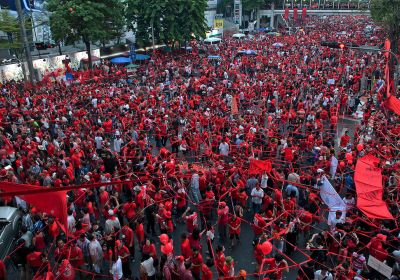 On September 19, about tens of thousands of protesters from Thailand’s resurgent Red Shirt movement (popular name for the United Front for Democracy against Dictatorship), took to the streets of Bangkok to defy the regime. Klaus Crimson, whose photographs of this historic rally can be seen at www.links.org.au, told Green Left Weekly: “It was truly an amazing experience. By 9am it was pretty clear to me that it might grow into something big.
On September 19, about tens of thousands of protesters from Thailand’s resurgent Red Shirt movement (popular name for the United Front for Democracy against Dictatorship), took to the streets of Bangkok to defy the regime. Klaus Crimson, whose photographs of this historic rally can be seen at www.links.org.au, told Green Left Weekly: “It was truly an amazing experience. By 9am it was pretty clear to me that it might grow into something big. -
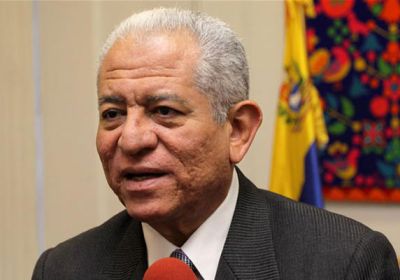 Ten years after the United Nations general assembly adopted the Millennium Development Goals, “the fulfillment of these goals are under serious threat”, Venezuelan ambassador to the United Nations Jorge Valero told the general assembly on September 21. The goals include cutting world hunger and the number of people living in extreme poverty by half Bolivian President Evo Morales said they would not be reached unless “we put an end to the unjust distribution of wealth”. He noted that 40% of the world’s poorest people own 5% of the wealth, while the richest 20% control 75%.
Ten years after the United Nations general assembly adopted the Millennium Development Goals, “the fulfillment of these goals are under serious threat”, Venezuelan ambassador to the United Nations Jorge Valero told the general assembly on September 21. The goals include cutting world hunger and the number of people living in extreme poverty by half Bolivian President Evo Morales said they would not be reached unless “we put an end to the unjust distribution of wealth”. He noted that 40% of the world’s poorest people own 5% of the wealth, while the richest 20% control 75%. -
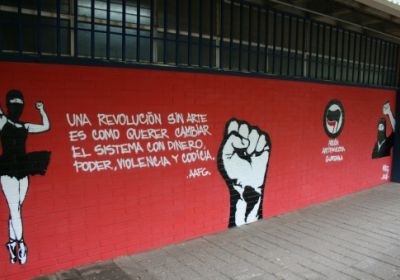 Protests against an attempt to stifle student participation in elections for representatives to faculty boards have triggered one of the most important student occupations seen in Central America in recent years. The occupation, which began in August, has shut down Guatemala’s sole public university, the University of San Carlos (USC). It has become a direct challenge to the privatising agenda of successive governments and university administrations.
Protests against an attempt to stifle student participation in elections for representatives to faculty boards have triggered one of the most important student occupations seen in Central America in recent years. The occupation, which began in August, has shut down Guatemala’s sole public university, the University of San Carlos (USC). It has become a direct challenge to the privatising agenda of successive governments and university administrations. -
 The year before England won the 1966 World Cup, I interviewed its captain, Bobby Moore. Having not long arrived in England from the antipodes, where “soccer” was a minority sport beloved by Italians and Croats, I did not have a clue about the game. Nevertheless, I had been assigned to write a “human interest” piece on the West Ham star by the same convivial assistant editor who had hired me believing I could play cricket, because I was Australian, and so assist the Daily Mirror team in its grudge match against the Express.
The year before England won the 1966 World Cup, I interviewed its captain, Bobby Moore. Having not long arrived in England from the antipodes, where “soccer” was a minority sport beloved by Italians and Croats, I did not have a clue about the game. Nevertheless, I had been assigned to write a “human interest” piece on the West Ham star by the same convivial assistant editor who had hired me believing I could play cricket, because I was Australian, and so assist the Daily Mirror team in its grudge match against the Express. -
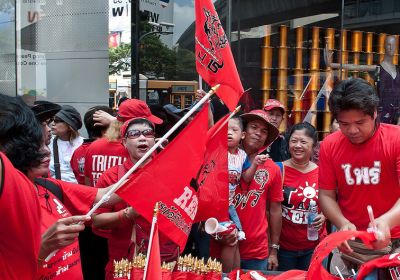 On September 19, tens of thousands of pro-democracy Red Shirts returned to the Ratchaprasong intersection in Bangkok to remember the military coup that took place four years ago, as well as the murder of about 90 unarmed demonstrators in April and May. Then, many of the protesters were gunned down by army snipers near Ratchaprasong. Since the brutal killings by the military-backed Abhisit Vejjajiva junta, there has been a climate of fear. Hundreds of political prisoners have been locked up and there is evidence of extrajudicial killings of Red Shirt activists.
On September 19, tens of thousands of pro-democracy Red Shirts returned to the Ratchaprasong intersection in Bangkok to remember the military coup that took place four years ago, as well as the murder of about 90 unarmed demonstrators in April and May. Then, many of the protesters were gunned down by army snipers near Ratchaprasong. Since the brutal killings by the military-backed Abhisit Vejjajiva junta, there has been a climate of fear. Hundreds of political prisoners have been locked up and there is evidence of extrajudicial killings of Red Shirt activists.